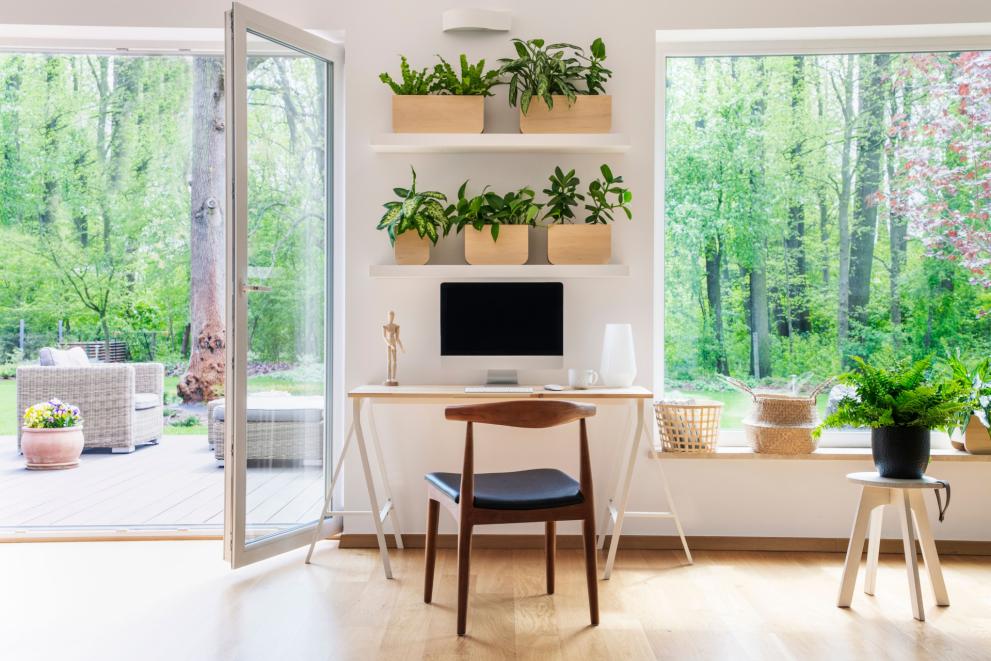
Choose your workplace wisely
It is important to choose a place in your home that you feel comfortable working in. You are going to spend eight hours a day in this space, so give some thought on an area you feel will allow you to be productive. There are some rooms that you should avoid, if possible, when thinking about workplaces. For example, it may not be a good idea to work from your bedroom as you already spend a large part of your time here. It is important to create a clear boundary between your working area and the rooms you associate with leisure. Choose a space that is dedicated to work. This could be a spare room, or even a corner of the living room.
Invest in the right equipment
Once you have chosen your ideal workplace, you should invest in some equipment that will make your life easier when working. To make your work experience enjoyable and comfortable, you should make ergonomic choices. A comfortable chair and desk that are suited to your body should not be seen as luxuries, but as necessary investments for you to work from home. Try to shop instore instead of ordering online; this will allow you to make an informed decision. If you can, invest in a height adjustable desk as sitting for long periods can lead to health issues in the future. You should also think about investing in a monitor, especially if you are using a laptop with a small screen.
Maximise the lighting in your workspace
Lighting is an important consideration when working from home. You want to look forward to working in your chosen space, so the character and quality of lighting is key to help you increase your productivity. Maximise natural lighting by sitting near a window. Alternatively, you could use a dedicated desk lamp to put light exactly where you need it. This can help you focus on intensive tasks that require concentration. Try to avoid direct glare from overhead lights by using lampshades to soften harsh light. These are a few considerations you can make when thinking about how you can use lighting to your advantage. Ultimately, proper lighting can help make for a more comfortable and productive work environment.
Minimise distractions
It can be difficult to eliminate distractions when working from home, especially if you live with family or friends. A lot of disruptions can arise that we do not have to deal with at the office. The first thing you should do is create a schedule and make sure everyone you live with is aware of your working hours. This will allow you to track your progress and improve your time-management skills. It will also help you stay focused. Investing in noise cancelling headphones is a good way to block out any unwanted and distracting sounds. Phones can be very distracting at work, so use features such as app locks, which limit your screen time. This will make it easier for you to concentrate and focus on getting your work done.
Changing careers can seem daunting, but with the right research and a positive attitude, it may not be as hard as you think. If you are ready for a change, here is our advice to keep in mind as you embark on a new path.
Related links:
Time for a change? How to change careers with no experience
Read more:
Find EURES Advisers
Living and working conditions in EURES countries
EURES Jobs Database
EURES services for employers
EURES Events Calendar
Upcoming Online Events
EURES on Facebook
EURES on Twitter
EURES on LinkedIn
Details
- Publication date
- 29 November 2023
- Authors
- European Labour Authority | Directorate-General for Employment, Social Affairs and Inclusion
- Topics
- Business / Entrepreneurship
- Hints and tips
- Related section(s)
- Hints & tips
- Sector
- Accomodation and food service activities
- Activities of extraterritorial organisations and bodies
- Activities of households as employers, undifferentiated goods- and services
- Administrative and support service activities
- Agriculture, forestry and fishing
- Arts, entertainment and recreation
- Construction
- Education
- Electricity, gas, steam and air conditioning supply
- Financial and insurance activities
- Human health and social work activities
- Information and communication
- Manufacturing
- Mining and quarrying
- Other service activities
- Professional, scientific and technical activities
- Public administration and defence; compulsory social security
- Real estate activities
- Transportation and storage
- Water supply, sewerage, waste management and remediation activities
- Wholesale and retail trade; repair of motor vehicles and motorcycles